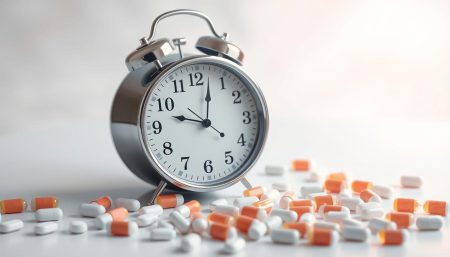Many people wonder how long marijuana detection time lasts after they stop using it. This is especially true for those facing drug tests or wanting to know how their body cleans itself. The cannabis elimination period can differ a lot, depending on many factors. Knowing how long weed drug test duration lasts is key for those quitting and worried about its effects on their jobs, legal status, or health goals.
THC, the active part of cannabis, doesn’t leave the body quickly. Its effects and leftovers stay in the body, showing how complex this topic is. Whether it’s for a job test or to clear THC from your body, the path to being clean is different for everyone.
Key Takeaways
- Individual variability makes precise predictions about marijuana detection time challenging.
- Different testing methods can detect cannabis use over varying timeframes, affecting the weed drug test duration.
- Understanding your own cannabis elimination period is important for legal, professional, and personal reasons.
- The elimination of THC from the system is a complex process influenced by numerous personal and lifestyle factors.
- Knowledge about the body’s natural detoxification process will help individuals who have stopped using cannabis plan accordingly.
Understanding THC and Its Effects on the Body
Tetrahydrocannabinol, or THC, is the main psychoactive part in cannabis. It affects the human body in many ways. THC works with the brain’s endocannabinoid system, which helps keep our bodies balanced. This interaction can cause physical and mental effects, influencing the THC clearance timeline and the effects of stopping cannabis.
When THC gets into your system, it mainly connects with cannabinoid receptors in the brain. It affects pleasure, memory, thinking, and more. This part talks about THC’s immediate effects and how it’s absorbed, which is key to knowing how long it stays in the body.
The effects of stopping cannabis can be different for everyone. People might feel mood changes, sleep issues, and changes in appetite. These signs show the body’s effort to get back to normal after stopping THC.
| Aspect | Impact on Body | Relevance to THC Clearance |
|---|---|---|
| Absorption | THC is absorbed quickly, affecting the central nervous system. | Dictates the immediacy of psychoactive effects. |
| Psychoactive Effects | Alters mood, behavior, and perception. | Engages cannabinoid receptors in the brain. |
| Withdrawal Symptoms | Includes mood swings, sleep issues, reduced appetite. | Signals the start of detoxification post-cessation. |
Knowing how THC affects the body helps us understand the THC clearance timeline and the effects of stopping cannabis. These points are key to knowing how long THC stays in the body as it returns to being THC-free.
Factors That Affect Marijuana Detection Time
When looking at the weed drug test duration, it’s key to know what affects THC detection. These include how often you use cannabis, your metabolism, body size, and THC strength. All these factors shape the cannabis withdrawal timeline.
Frequency of Use
Knowing how often you use cannabis is vital for THC detection. Regular users may have THC in their body fat for longer. This makes it harder to pass drug tests. On the other hand, those who use cannabis less often might have a shorter detection window.
Body Mass and Metabolism
Your body mass and metabolism also matter. People with more body mass and slower metabolisms may take longer to detox. This means THC can be detected in their systems for longer.
THC Potency in Consumed Cannabis
The THC level in cannabis is another key factor. Products with higher THC levels mean more THC in your body. This can make it harder to pass drug tests for longer.
| Factor | Impact on Detection Time |
|---|---|
| High Frequency of Use | Longer detection time due to accumulation |
| Low Frequency of Use | Shorter detection time |
| High Body Mass & Low Metabolism | Extended detox period |
| Low Body Mass & High Metabolism | Reduced detox period |
| High THC Potency | Increased detection duration |
| Low THC Potency | Decreased detection duration |
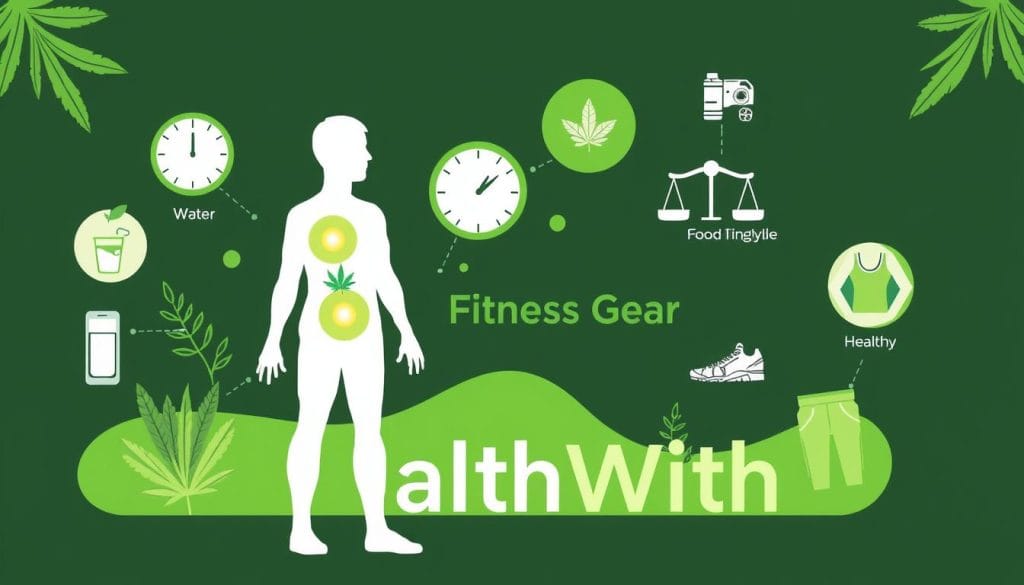
The Role of Metabolites in Weed Detection
Understanding THC metabolites is key when asking how long weed stays in your system after you stop using it. THC metabolites are what your body makes from marijuana’s active parts. They are the main reason weed can show up in drug tests long after you feel its effects.
What are THC Metabolites?
THC metabolites are what your liver makes when it breaks down THC, the part of cannabis that gets you high. Knowing how long these substances last in your body is important. They stick to fat in your body, so they stay longer than THC itself.
How the Body Processes THC
How THC is broken down in your body can differ from person to person. But, it usually goes through a few steps in your liver. Enzymes in your liver turn THC into substances like THC-COOH, which is then passed out of your body over time. This is why weed can still show up in tests even after you feel its effects have gone away.
| Phase | Process | Duration |
|---|---|---|
| 1. Absorption | THC enters the bloodstream. | Minutes to hours |
| 2. Distribution | THC and its metabolites are distributed throughout the body’s tissues. | A few hours |
| 3. Metabolism | THC is broken down in the liver. | Days to weeks |
| 4. Excretion | Metabolites are excreted, mainly through urine. | Weeks to months |
Understanding how THC is broken down in your body is crucial. It helps explain how long weed can be detected and answers the question of how long weed stays in your system after you stop using it.
Various Weed Drug Test Methods and Their Duration
There are many ways to find out how long weed stays in your system. Each method has its own benefits and how long it can detect THC. Knowing these can help you manage your weed use better.
Urine Testing
Urine tests are the most common way to find THC in your system. They can spot weed use from days to weeks after you last used it. This method is liked because it’s easy and can find weed for a long time.
Blood Testing
Blood tests can find THC for a shorter time but are very good at spotting recent use. THC stays in your blood for up to 36 hours after you use it. This makes it great for checking if someone used weed very recently.
Saliva Testing
Saliva tests are becoming more popular because they’re easy to do and can be done anywhere. THC shows up in saliva for about 24 to 48 hours after use. Police often use these tests to check for weed use on the road.
Hair Follicle Testing
Hair follicle tests can find THC for the longest time, up to 90 days. They take a small hair sample and are used in legal cases and job screenings. This method is very good at finding weed use over a long time.
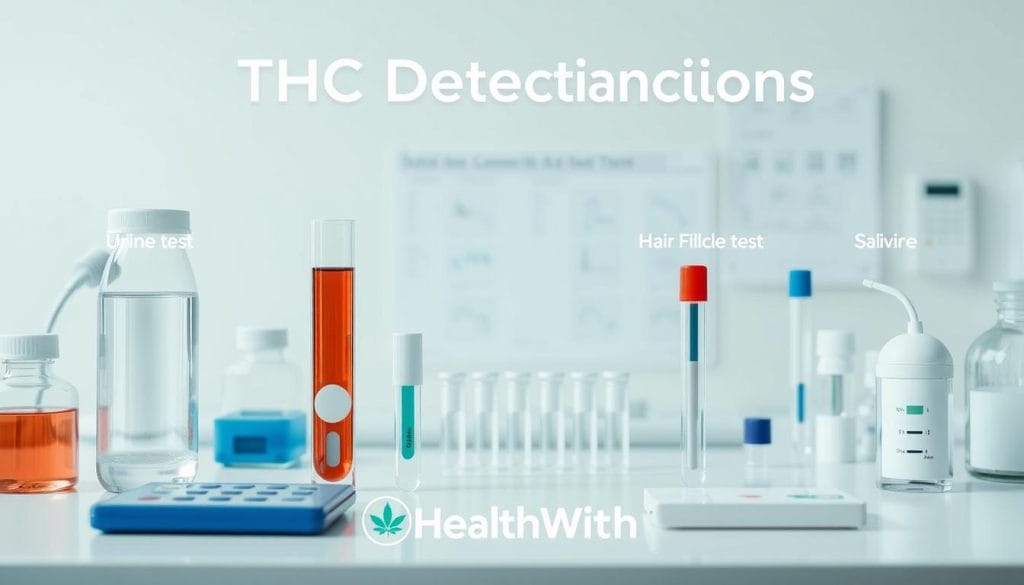
Exploring the Pot Metabolite Half-Life
Knowing how long THC stays in your system is key, especially if you’re facing a weed drug test. THC is the main psychoactive part of cannabis. The half-life of THC metabolites is important to understand. These are what your body makes from THC.
The half-life of a drug is how long it takes for half of it to leave your body. This time can change based on how often you use it and how your body works. For THC metabolites, knowing this helps figure out how long you’ll test positive for weed.
Understanding THC half-life is essential for accurately predicting how long it will take for the drug to become undetectable in your body.
THC metabolites can stay in your body for a long time. Here’s a look at how long based on how often you use:
| Usage Frequency | Average Half-Life of THC Metabolites | Estimated Detection Window |
|---|---|---|
| Occasional Users (1-3 times per week) | 1-3 days | Up to 10 days |
| Moderate Users (4 times per week) | 3-5 days | Up to 21 days |
| Daily Users | 5-10 days | Up to 30 days or more |
| Heavy Users (Multiple times per day) | 10-15 days | Up to 90 days |
Keep in mind, these are just averages. Your body’s specifics can affect how fast THC metabolites leave. Things like your weight, age, how much you drink, and how active you are all matter.
So, how long weed stays in your system after you stop using it? It’s different for everyone. The half-life of THC metabolites is a big part of this. It depends on your health and how you use weed.
THC Clearance Timeline for Occasional Users
Knowing how long THC stays in your system is key for both personal and legal reasons. For those who use cannabis now and then, THC is usually gone faster than for regular users.
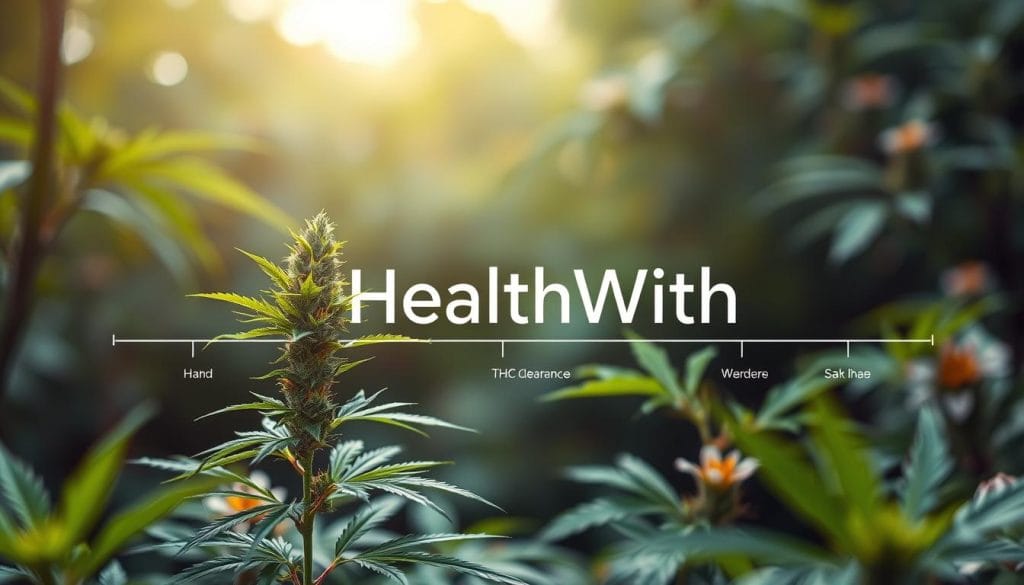
The time it takes for THC to leave your system depends on many things. These include how fast you metabolize, how much you use, and the weed’s strength. Yet, we can still guess the time based on what people say and science.
| Type of Test | Detection Time |
|---|---|
| Urine Test | 1 to 7 days |
| Blood Test | 1 to 2 days |
| Saliva Test | 1 to 3 days |
| Hair Follicle Test | Up to 90 days |
It’s clear that how long THC stays in your system can change a lot. If you use cannabis only sometimes, knowing these times is crucial. This is especially true if you might get tested for work or other reasons.
Cannabis Elimination Period for Regular Users
For those who use cannabis often, getting rid of THC in their system is different from occasional users. Knowing how long it takes to remove cannabis from the body is key for those trying to stop its effects and detox. This part looks at what affects this time frame.
Removing cannabis from a regular user’s body is complex. It depends on how often they use it, their body fat, and how fast they metabolize. For regular users, THC stays in fat cells, slowly coming out over time. This makes detoxing longer.
- The type of cannabis consumed (potency levels).
- Individual metabolic rate, which can enhance or delay THC expulsion.
- Overall body composition and health.
- Usage habits, including the method and frequency of cannabis intake.
Because of these factors, detox for regular users can take weeks to months. It’s important to remember this for those trying to stop cannabis effects.
Frequent users may find the process of detoxification lengthier due to the accumulation of THC in fat cells which releases slowly over time.
For a smoother detox, it’s best to talk to a healthcare professional. They can give advice tailored to your situation. This ensures a safe and effective way to stop cannabis and its effects in your body.
Natural Detox Process of the Body After Quitting Weed
Knowing how the body naturally cleanses itself is key when talking about the cannabis withdrawal timeline. This process helps get rid of THC and its byproducts. It’s especially important for those who decide to stop using cannabis. Starting this process can greatly improve both physical and mental health.
The Importance of Hydration
Hydration is crucial during detox. Drinking more water helps remove toxins from the body. It also supports the kidneys and liver, which are vital for detox.
Dietary Considerations for Detoxification
What you eat can greatly affect how well you detox. Eating foods high in antioxidants, fibers, and vitamins helps the liver clean the body. Fruits, vegetables, and whole grains are great choices.
| Benefit | Hydration | Dietary Choices |
|---|---|---|
| Supports organ function | Kidneys, Liver | Liver |
| Expels toxins | Yes | Yes |
| Enhances metabolism | Increases rate | Improves efficiency |
| Source of nutrients | Minerals | Vitamins, Minerals, Antioxidants |
Using strategies like drinking enough water and eating well are important for natural detoxification after stopping cannabis. These actions help detox effectively and speed up the body’s adjustment after stopping cannabis. Making lifestyle choices that support health is crucial during the cannabis withdrawal timeline.
Stopping Cannabis: Immediate Effects and Withdrawal Timeline
When people stop using cannabis, their body starts to adjust without THC. Knowing about the stopping cannabis effects and the cannabis withdrawal timeline helps them prepare for changes.
Right after stopping cannabis, people can feel different in many ways. Some might start feeling withdrawal symptoms in a few days. Others might notice changes later. Here’s a typical timeline and symptoms that might happen during this time.
| Timeframe | Symptoms |
|---|---|
| 24 Hours | Mood swings, irritability, headaches |
| 2-3 Days | Nausea, cravings, restlessness |
| 1 Week | Insomnia, vivid dreams, increased anxiety |
| 2 Weeks | Improved sleep, decreased irritability, stabilizing mood |
| 1 Month | Normalizing of appetite and habits, return of natural sleep patterns |
This timeline shows a general path for quitting cannabis. The time and how bad symptoms are can change based on how dependent someone is and their health. Knowing these patterns helps manage expectations and prepare for stopping cannabis.
Potential for False Positives in Weed Drug Tests
It’s important to know about the THC clearance timeline and weed drug test duration. This is because false positives can happen in drug tests. False positives can be caused by many things, like eating foods or taking medicines that can trick THC tests. This part talks about why these false alarms happen and how to avoid them.
One reason for false positives is eating certain foods or taking supplements that have similar chemicals to THC. For example, CBD products, which are used for health reasons and don’t get you high, can sometimes show up as THC in tests. To learn more about CBD and its health benefits, check out this detailed look.
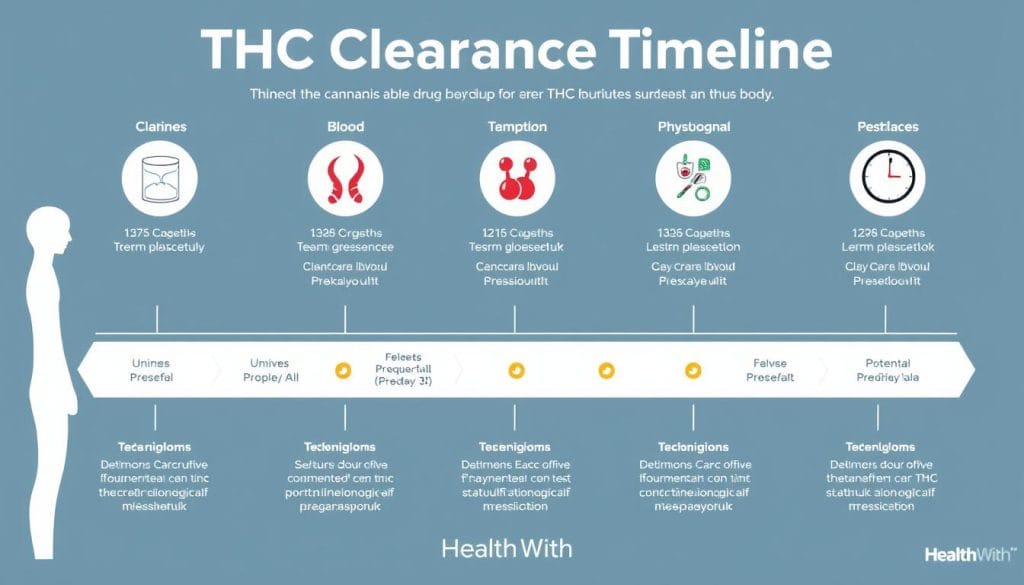
- Products containing hemp seed oil
- Certain over-the-counter medications
- Food items with poppy seeds
It’s key for people and professionals to know about these things. This helps in better preparation and understanding of drug test results.
Here are some ways to get more accurate test results:
- Use specific testing methods that can tell THC apart from other substances.
- Do confirmatory tests like GC-MS (Gas Chromatography-Mass Spectrometry). This method is very accurate and can lower false positives.
- Ask about someone’s drug use history before testing. This helps in understanding unexpected results.
Knowing the weed drug test duration and taking the right steps can lower false positives. It shows the need for better drug testing technologies and rules. We need tests that are accurate and reliable in all situations.
The Legal Impacts of Weed Consumption and Drug Testing
The mix of marijuana detection time and legal implications of cannabis use is complex. It’s especially true in jobs and legal settings. Knowing the laws in different places is key for everyone.
In the workplace, using cannabis can change hiring, keeping employees, and rules for misconduct. Employers face a big challenge. They must follow laws that change by state and even city. The main issue is how long THC stays in someone’s system, which varies a lot.
Also, how long THC stays in your system can lead to legal problems. For example, in workplace accidents or when following federal rules, even if it’s legal in your state. Some jobs require no cannabis use, making it hard for those who use it legally outside work.
| State | Employment Drug Testing Laws | Recreational Use Legal |
|---|---|---|
| California | Employers can test, but not pre-employment for recreational use | Yes |
| Texas | Testing allowed; no restrictions specific to cannabis | No |
| New York | Cannot test pre-employment for cannabis | Yes |
| Florida | Can test if reasonable suspicion exists | No |
The table shows how different state laws affect work and legal issues with cannabis testing. Knowing about marijuana detection time and legal implications of cannabis use is vital for following the law and avoiding trouble.
Legal experts say it’s important to keep up with state and local laws. These laws can change and might be stricter than state laws. Businesses need to update their policies often.
In short, understanding laws about work, personal use, and travel with cannabis is crucial. It helps everyone stay legal and deal with the complex issues of cannabis detection times.
How Long Does Weed Stay in System After Quitting?
Understanding how long does weed stay in system after quitting requires looking at several factors. These include biological aspects and lifestyle choices that affect the cannabis elimination period. This summary highlights the complexity of THC clearance from the body.

The time THC stays in your body changes a lot. It depends on how often you use it, your metabolism, and the cannabis’s strength. So, the cannabis elimination period varies greatly from one person to another.
| Test Type | Detection Window |
|---|---|
| Urine Test | 3 days to 30 days |
| Blood Test | 1 day to 7 days |
| Saliva Test | 1 hour to 3 days |
| Hair Follicle Test | Up to 90 days |
These ranges give a general idea, but they can change a lot. It’s important to remember that they can vary based on your metabolism and health. For a more accurate estimate, talk to medical experts or testing professionals.
Tips on Accelerating THC Clearance from Your System
Getting THC out of your body fast is important for drug tests or detox. Exercise and detox products for marijuana can help a lot. Here are some good ways to do it:
Exercise and Active Lifestyle
Regular exercise is good for your health and helps clear THC. It burns fat, where THC is stored. But, don’t exercise too close to a drug test, as it might raise THC levels.
Consider Detox Products
Many detox products for marijuana claim to remove cannabis traces. But, their effectiveness varies. It’s key to pick ones with good reviews. Here’s a look at some popular ones:
| Product Name | Type | Active Ingredients | User Ratings |
|---|---|---|---|
| Detoxify XXTRA Clean | Liquid | Herbs, Vitamins, Minerals | 4.5/5 |
| Rescue Cleanse 32oz | Liquid | Creatine, Vitamins, Herbs | 4.0/5 |
| Herbal Pre-Cleanse Capsules | Capsules | Herbs | 3.8/5 |
Using detox products with hydration and a balanced diet can help. But, remember, these methods don’t guarantee you’ll pass a drug test.
Considerations for Medical Marijuana Patients
As medical marijuana users navigate their healthcare and legal environments, certain THC clearance considerations become pivotal. This segment explores crucial aspects that medical patients should consider regarding THC presence and their rights.
Medical marijuana users must often balance their therapeutic needs with compliance to various drug testing protocols. This might be required by employers or as per legal stipulations. Understanding THC metabolization timeframes and having open communication with healthcare providers and employers are essential steps in managing one’s medical and professional life.
In addition to understanding biological factors affecting THC clearance, medical marijuana users need an awareness of their legal rights and protections under local laws. This knowledge will empower them to advocate for themselves in medical, employment, and legal settings.
| Aspect | Consideration |
|---|---|
| Legal Awareness | Knowledge of state and federal laws regarding medical cannabis use. |
| THC Detection | Potential THC detection in drug tests and its impact on employment. |
| Communication | Proactively communicating status as a medical marijuana patient to relevant parties. |
| Healthcare Liaison | Regular discussions with healthcare providers about THC use and clearance. |
For many medical marijuana users, these considerations provide a fundamental framework for successfully managing their treatment while navigating related THC clearance considerations. Regardless of the situation, having a transparent approach can significantly smooth potential legal and professional hurdles.
Conclusion
Exploring how cannabis affects the body shows us a lot. The cannabis withdrawal timeline and effects of stopping use vary greatly. Factors like metabolism, body size, and how often and long you use it all matter.
We looked at different ways to test for weed and how long it stays in your system. It’s clear that everyone’s experience is unique. There’s no single answer to how long weed stays in your system after you stop using it.
Understanding the details, like THC metabolites and how our bodies naturally detox, is key. It shows that patience and knowledge are crucial when trying to get weed out of your system. The effects of stopping cannabis can be different for everyone. They show why it’s important to know what to expect when you stop using it.
Knowing how THC interacts with our bodies is important. It helps us understand how to manage withdrawal and detection. Whether you’re facing a drug test, worried about the law, or just curious, this information helps. It shows the unique journey of marijuana metabolism and how to get THC out of your system.
FAQ
How long does weed stay in your system after quitting?
Weed can stay in your system for days to months after quitting. This depends on how often you use it, your body mass, metabolism, and the weed’s potency. Urine tests can detect marijuana use for up to 30 days. Hair follicle tests might show positive results for up to 90 days after quitting.
What factors affect how long marijuana stays in your system?
Several factors affect how long marijuana stays in your system. These include how often you use it, your body mass, metabolism, and the weed’s THC content. Each factor can either increase or decrease the detection window for THC and its metabolites.
How is THC metabolized in the body?
THC is broken down by the liver into various metabolites, including THC-COOH. These metabolites are then eliminated through urine and feces. The time it takes for half of the substance to be eliminated from your body is key in determining how long weed will be detectable.
What are the different methods of weed drug testing, and how do they differ?
There are several methods of weed drug testing, including urine, blood, saliva, and hair follicle tests. Urine testing is the most common, with a detection window of a few days to a month for regular users. Blood tests have a shorter window, detecting THC for up to a few hours to a couple of days. Saliva tests also have a short detection period, usually up to 24-48 hours. Hair follicle tests can detect marijuana use for up to 90 days or longer.
What is the THC clearance timeline for occasional vs. regular users?
THC can be cleared from occasional users’ systems within a few days. However, regular or heavy users may have detectable levels of THC for several weeks to even months after stopping. This reflects differences in how the body processes and accumulates THC over time based on usage patterns.
Can natural detox methods help clear THC from the body?
Natural detox methods like staying hydrated, eating healthy, and exercising can support the body’s detox process. While these practices can improve overall health, they are unlikely to significantly speed up THC metabolite metabolism.
What are the immediate effects of stopping cannabis use and the withdrawal timeline?
Stopping cannabis use can disrupt sleep, appetite, and mood. Withdrawal symptoms can start within the first week and may include irritability, anxiety, and cravings. These symptoms vary but usually subside after a few weeks.
Can you get a false positive on a weed drug test?
Yes, false positives on weed drug tests are possible. They often occur due to cross-reactivity with other substances or improper testing procedures. It’s crucial to ensure the accuracy of a drug test result by using confirmatory testing, such as gas chromatography-mass spectrometry (GC-MS), if an initial positive result is obtained.
What should medical marijuana patients consider when it comes to THC in their system?
Medical marijuana patients should be aware of THC’s potential to remain in their system. They should consider this when facing drug tests. It’s important to communicate your status as a medical marijuana patient and provide documentation to employers or other relevant parties to avoid legal or professional complications.
Are there any proven tips to accelerate THC clearance from your system?
There is limited scientific evidence for specific products or practices that can significantly speed up THC clearance. Exercise and staying hydrated may help a bit. However, the most effective strategy is time, as the body naturally eliminates THC metabolites.


















